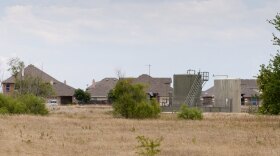Next month, the Arlington City Council will vote on whether to give final approval to a French natural gas company’s plan to expand fracking operations near a daycare.
TotalEnergies operates a natural gas well that sits just over 600 feet from the Mother's Heart Learning Center near State Highway 360 in Arlington. The company wants to drill three more wells on the same site.
Two weeks ago, the Council voted to approve TotalEnergies’ request to establish a drill zone at the site, although the company still needs final approval from the council on drilling permits.
Potential health risks
Multiple physicians spoke at a Nov. 30 meeting about the potential health risks the community could face if the permits are approved, including Floyd Ostrom, a retired pediatric physician.
"Public health and the citizens of Arlington will be at risk if more wells are allowed to be drilled in close proximity to daycares, schools, parks and residential areas,” he said. “Those risks are especially high for children and pregnant women.”
The Oxford Research Encyclopedia of Global Public Health published a study in 2019, which found that unconventional natural gas development — which includes hydraulic fracturing, or fracking — is associated with preterm birth, high-risk pregnancy, and low birth weight. It’s also been linked to three kinds of asthma exacerbations, as well as nasal and sinus issues and migraine headaches.
Ranjana Bhandari, executive director of the environmental advocacy group Liveable Arlington, said it’s clear the proximity to these sites are having a negative impact on children’s health just based on the rates of childhood asthma in Tarrant County, where Arlington is located.
The University of North Texas Health Science Center estimates roughly 19% of Tarrant County children have been diagnosed with asthma, compared to the national average of about 8%.
“There’s a very large body of scientific research that links proximity to drilling to asthma,” Bhandari said. “And these effects can often be observed as far as 10 miles away.”
More than 30,000 Arlington children attend public school within just half a mile of a natural gas well, according to an investigation in June by Reveal from The Center for Investigative Reporting, and up to 7,600 infants and young children attend daycares within that radius.
Kevin Strasser, Total’s local spokesperson, said the company is working to make changes to reduce emissions.
“We implement a nano-additive to our completion equipment that reduces emissions on our sites during the completion process, and we recently announced we’re implementing new electric valves as opposed to our pneumatic valves, which reduces any emissions possible at the site,” he said.

Racial disparities
TotalEnergies tried to get the same drilling permits approved last June, amid widespread protests over the murder of George Floyd and what some called a “racial reckoning” in the U.S. They were met with pushback from the surrounding community of East Arlington, a neighborhood that’s home to predominantly Black and Latino residents, and the request was denied.
With council members approving the drill site at the Nov. 30 meeting, residents are accusing them of changing their stance — even though the circumstances themselves haven’t.
“Why would the vote [in January] be different than the ‘no’ vote from last year?” Arlington resident Tammy Carson asked. “Last year the Black Lives Matter movement was all over the news. Are the lives and health of these residents, your constituents, any less important now than when that phrase was trendy?”
Wanda Vincent, the owner and director of Mother’s Heart Learning Center, said all of the children who attend her daycare are Black or Latino and the city would be doing them a disservice by approving the permits.
“The health and safety of our children is of the utmost importance to our mission, and the drill site in our backyard has now placed a big question mark on that for me, for my parents and for my community,” Vincent said. “How do we tell our children that they can be whatever they desire? But you will sell their health and safety for millions of dollars because of the color of their skin.”
Legal challenges
Arlington City Council member Andrew Peel said one of his concerns if Arlington were to deny the permits again, would be costly legal battles.
A Texas law, HB 40, limits what regulations local governments can place on oil and gas drilling.
“If we deny this permit … Total can sue the city of Arlington, win and drill their wells anyway,” Peel said. “And in that case, we would have to pay hundreds of thousands of dollars.”
The council will vote on whether to approve or deny Total's permits on Jan. 4.
Got a tip? Email Rebekah Morr at rmorr@kera.org. You can follow her on Twitter @bekah_morr.
KERA News is made possible through the generosity of our members. If you find this reporting valuable, consider making a tax-deductible gift today. Thank you.






